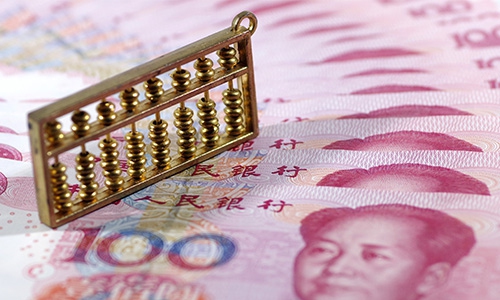Russian corporate giants issue yuan bonds as China’s huge economy, stable monetary policy strengthen currency

Renminbi Photo: VCG
Use of Chinese yuan continues to expand in Russia, as another Russian mining giant has issued 4.6 billion yuan ($666 million) in bonds, the second time within one month that Russian companies make such an issue.
Chinese analysts say Russian market players are exploring the yuan as an alternative to the US dollar and the euro, as the US has frequently abused its currency hegemony, seriously hitting its credibility in the international market. Meanwhile, market demand for the yuan has kept rising.
Russia's largest gold miner, PJSC Polyus, has completed the issuance of 4.6 billion yuan in bonds, less than one month after Russian aluminum company Rusal issued 4 billion yuan-denominated bonds in the Russian market.
PJSC Polyus completed the five-year issue on Tuesday, and the bonds were listed on the Moscow Exchange with a coupon rate of 3.8 percent. The bond underwriter was Gazprombank, according to caixin.com.
According to the issue documents, banks accounted for 71 percent of the buyers, investment companies accounted for 15 percent, individual investors accounted for 13 percent, and asset management companies made up the left 1 percent.
Gazprombank said that no threshold was set for individual investors, and the single subscription amount was only 1,000 yuan.
The issuance of foreign-currency bonds mainly depends on whether the target country meets the conditions like it is a strong economy, has stable financial and monetary policies and large capital market volume, according to Zhang Hong, an associate research fellow at the Institute of Russian, Eastern European and Central Asian Studies of the Chinese Academy of Social Sciences.
"China has performed well in all these aspects," Zhang told the Global Times on Thursday.
Zhang explained that the economic sanctions imposed by the US and its European allies on Moscow have shut the door for Russia's financing in the European and American markets, and Russian companies urgently need new investment channels. China's economic development is resilient, and its market size is huge and still growing, which can meet Russia's capital needs.
In addition to the sweeping economic sanctions imposed on Russia, the US has frequently abused its currency hegemony, which have damaged the US dollar's reputation in the international market and made Russian market demand for the yuan rise, Zhang noted.
International demand for the yuan has shown an upward trend since the beginning of this year amid global geopolitical and economic changes.
Russian firms and banks were involved in almost 4 percent of international yuan payments by value in July. That was an increase from 1.42 percent the previous month and zero in February when the Russia-Ukraine conflict began, a report from the global financial messaging entity, Society for Worldwide Interbank Financial Telecommunication, showed.
The yuan maintained its position as the fifth most active currency for global payments by value in July, signaling a stable internationalization pace. Russia jumped to become the third-largest market using the yuan for global payments.
The issuance of yuan-denominated bonds by Russian companies is primarily a reflection of China's growing economic strength, and it also shows the continuous increase in trade ties between the two countries, Wang Peng, a research fellow at the Beijing Academy of Social Sciences, told the Global Times on Thursday.
The yuan has kept a stable internationalization pace supported by promising prospects for the Chinese economy.
China's Ministry of Finance and the Macao Special Administrative Region (SAR) government on Wednesday jointly announced a plan to issue yuan-denominated treasury bonds worth 3 billion yuan in Macao on September 7, a move to strengthen financial cooperation between the Chinese mainland and the SAR.
And, the Ministry of Finance issued yuan-denominated treasury bonds worth 5 billion yuan in the Hong Kong SAR on August 10.
